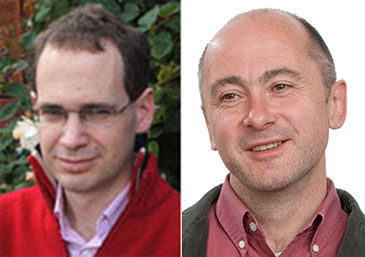Professor Jeremy Harvey in the School of Chemistry and Professor Jonathan Keating in the School of Mathematics have both received the award for their research projects.
Jointly funded by the Wolfson Foundation and the Department for Business, Innovation and Skills, the scheme aims to provide universities with additional support to enable them to attract science talent from overseas and retain respected UK scientists of outstanding achievement and potential.
Professor Harvey’s project, ‘Theoretical models of the kinetics of homogeneous catalysis’, examines the use of one sort of molecule (the catalyst) to accelerate the conversion of other molecules into desired products. Both the chemical industry and nature make extensive use of catalysis; natural catalysts are biological molecules known as enzymes. Harvey’s work uses theoretical methods, based on the quantum mechanical properties of the electrons that hold molecules together, to predict the pathways followed during catalysis, and the rate at which catalysed reactions take place, ie their kinetics. This helps understand the biological catalysts, and also helps to design new catalysts.
Professor Keating’s project, ‘Statistics of arithmetic functions and matrix integrals’, is investigating a new way to tackle many simple but still unanswered questions about whole numbers (integers): for example, the distribution of the prime numbers, the number of divisors of different integers, and the numbers that are not divisible by the square of any smaller number. Keating’s group recently discovered that one important class of questions can be re-expressed in a form that makes them amenable to attack using techniques first developed by mathematical physicists to analyse complex quantum mechanical systems, such as large atomic nuclei and electrons subject to random forces. Their goal is now to extend this connection to a much wider class of problems, and to test their belief that this approach will allow them to answer several long-standing questions.
